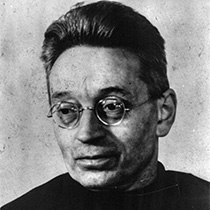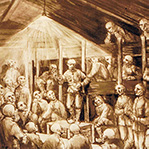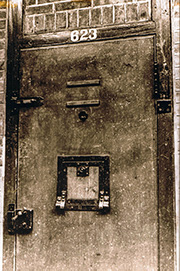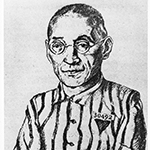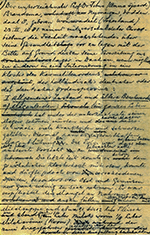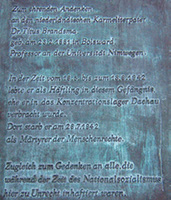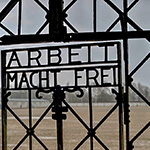Way of the Cross
by Titus Brandsma, O. Carm.
I DO NOT KNOW WHAT AWAITS ME, BUT I KNOW MYSELF TO BE ENTIRELY IN GOD’S HANDS
Station I – 19 January 1942
Titus Brandsma arrested by the Gestapo at the Karmelklooster in Nijmegen.
Titus: “Yes, yes, it is something to be in prison at the age of sixty.” Policeman: “Yes, Professor, You’re right. But if it’s your own fault, then you shouldn’t have accepted the Archbishop’s commission!” Titus: “I consider that an honor.”
Notes: Titus Brandsma, O. Carm.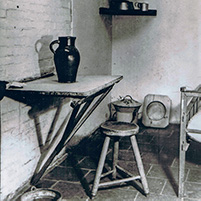
Station 2 – 20 January 1942
Titus is transferred to the prison of Scheveningen, the ‘Oranjehotel’, cell 577.
“It was no Inferno, my cell no. 577. And when I entered it, I didn’t read above it: ‘Let those who enter here now abandon all hope’. It did not look ominous and when the prison officer, who was helping the guard, apparently pointed out to the soldier that the cell was not ready, he said: “It’s only for one night.”
Notes: Titus Brandsma, O. Carm.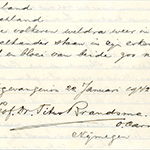
Station 3 – 21 January 1942
Beginning of the interrogation by SS Hauptscharführer, P. Hardegen.
“The attitude of the Dutch Episcopate, I make it mine as well.”
Notes: Titus Brandsma, O. Carm.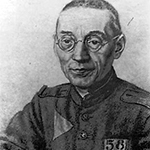
Station 4 – 12 March 1942
Titus is transferred to the Polizeiliches Durchgangslager Amersfoort.
“Between the evening meal and the moment the lights went out, you had half an hour for yourself. But you were not allowed to leave the barracks. That was strictly forbidden. Titus did it anyway. While others were spending those paltry thirty minutes on themselves, he risked his life to see if anyone else needed his spiritual support. In particular, he looked for prisoners of whom it was known would be executed shortly afterwards. That made a big impression on me as well. He was a true shepherd of souls.
Station 5 – 3 April 1942
Good Friday. Titus offers an instruction on suffering in Dutch mysticism.
“Titus’ words made an enormous impression on all present. That someone in those bizarre circumstances could talk about something like that – not about hunger, not about pain, not about exhaustion, but about mysticism. That was amazing! He taught you that even in inhuman circumstances you could keep “embrace” your humanity.”
Station 6 – 28 April 1942
At the prison in Scheveningen, cell 623.
“Late in the evening one day in April, our cell door no. 623 in the barracks is thrown open and with a “Los, Los! (Come on. Come on)
In the evening, after dinner, we would always play cards for an hour. During that time, the professor would pray again, and it was time to forget our worries in our sleep. On Sunday mornings, we had a meditation and prayer. Also, on Ascension Day, the professor held a service. Those were really great moments in our lives.”
Station 7 – 6 May 1942
Sentence: deportation to Dachau, Germany, for the duration of the war.
When Titus heard his verdict he was allowed to call his monastery. “Yes, Father Prior ,this really is Father Titus! At the moment I am at the SD-office in The Hague. I’ve been interrogated again. They have decided to send me to Dachau, one of the biggest concentration camps in Germany. This means that I will be kept there until the end of the war. (…) No, don’t worry about me.
Station 8 – 16 May 1942
Titus is transferred to the prison in Kleve.
“His virtue had nothing striking about it, but seemed to be self-evident. It did not give the impression that he had to make an effort to be equable, patient, content, cheerful and just in his judgement. I am convinced that Father Titus considered heaven as the only goal of his life, that he always had eternity in mind. Otherwise his whole attitude cannot be explained.”
Station 9 – 13 June 1942
Departure from Kleve to Dachau concentration camp, via Frankfurt and Nüremberg – a five day’s journey.
“On the Friday before his departure for Dacha the following Saturday, I gave him Holy Communion for the last time. I was very impressed to have been able to give the Body of the Lord to such a special person,so full of holiness.”
Station 10 – 19 June 1942
Arrival at the concentration camp, Dachau.
“The anger of the Stubeälteste knew no bounds, he hit and kicked Titus wherever he could, so that he rolled over on the ground and tried to crawl to the threshold of the dormitory. (…) But Titus doesn’t want a word of comfort. He looks at me, smiling, and says in a whisper: “Oh brother, I knew who I was carrying. He points to the glasses box, in which a piece of the consecrated host is hidden.”
Prisoner: Raphael Tijhuis, O. Carm
Station 11 – 18 July 1942
Titus is transferred to the sick barracks due to weakness and total exhaustion.
“I say goodbye to Titus, who thanks me for all the help and gives me greetings for the others on our block. “It’s only for a few days,” he says. “By the way, brother, by August we’ll all be back home,” he adds, laughing. This was always his saying. They were the last words I heard out of his mouth. We did not see him again.”
Prisoner: Raphael Tijhuis, O. Carm.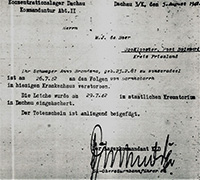
Station 12 – 26 July 1942
Notice of death, signed at 2 p.m.

